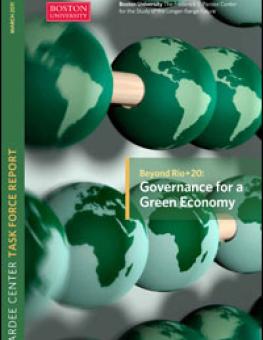
Beyond Rio+20: Governance for a Green Economy
As an intellectual contribution to the preparations for the 2012 United Nations Conference on Sustainable Development (UNCSD, a.k.a. Rio +20).
Boston University's Frederick S. Pardee Center for the Study of the Longer-Range Future convened a task force of experts to discuss the role of institutions in the actualization of a green economy in the context of sustainable development. A stellar group of experts from academia, government and civil society convened at the Pardee Center and were asked to outline their ideas about what the world has learned about institutions for sustainable development from the past, and what they might propose about the governance challenges and opportunities for the continuous development of a green economy in the future. The task force members were encouraged to think big and think bold. They were asked to be innovative in their ideas, and maybe even a little irreverent and provocative. They were charged specifically not to come to consensus about specific recommendations, but to present a variety and diversity of views. This report presents their thoughts and ideas.
Participating experts
You might also be interested in
December 2024 | Carbon Minefields Oil and Gas Exploration Monitor
In November 2024, 23 oil and gas exploration licences were awarded across five countries, with Russia granting the licences that account for the largest portion of embodied emissions.
Increased Support Needed to Achieve India's Clean Energy Goals
India is on track to achieve many of its 2030 clean energy goals but needs to step up government support measures to accelerate the deployment of offshore wind, electric vehicles, and green hydrogen, according to a new report.
Budgeting for Net Zero
This study estimates the cost gap for battery energy storage systems (BESSs), offshore wind, solar photovoltaic (PV), electric vehicles (EVs), and green hydrogen (GH2) to inform government support.
Artisanal and Small-Scale Mining of Critical Minerals
This report examines the potential for artisanal and small-scale mining (ASM) to take an expanded role in the global supply of critical minerals.